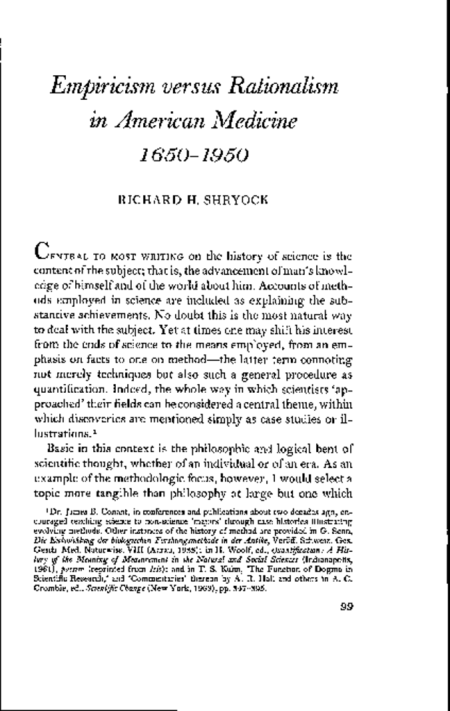Usually meaning a difference in emphasis, the distinction between the empirical versus the rational approach to medicine provided a controversy for almost 1,700 years. As late as 1800, nearly all helpful drugs or techniques had been found by chance. By about 1750, however, a more sophisticated type of empiricism was phasing out such supernatural elements as theology, astrology, and witchcraft, from medical thought. A few physicians endorsed a mid-course between extreme methods - a "scientific empiricism," combining theory with observation and experiments. While extreme rationalists continued to argue the existence of a single basic illness, a more empirical approach continued in gross anatomy, promising utility in surgery and obstetrics. Advancing knowledge through sense impressions, anatomists were rationalistic only in deducing physiologic functions from observation. Abnormalities and injuries in body parts were gradually noticed, and relationships with antemortem symptoms began to be suspected. Rational knowledge of infectious diseases was finally provided during the 1870's in medical pathology. Although revolt against speculative systems was aided by disillusionment with drastic therapy, unchecked speculation did not disappear even after 1900. Homeopathy, a sect known as eclecticism, and a series of healing cults flourished throughout the 19th and into the 20th century. Emphasizing one cause or condition of illness and/or one type of cure, they resembled earlier systems within regular medicine and, in their lack of technical knowledge, resembled crude empiricism. Homeopaths were adopting regular medicine by the early 1900's. Representing opposite extremes of the methodologic spectrum and different needs, two new cults (osteopathy and Christian Science) appeared in the 1890's. Mid-20th-century osteopathic colleges, also borrowing from regular medicine, appeared to be grade-B medical schools. One instance of the reappearance of unverified speculation within regular medicine was that of the formulation of psychoanalysis. Although providing some still-useful concepts, psychoanalysis contained doctrinaire and exaggerated teachings. The greatest weakness of crude empiricism was that claims could not be fitted into any recognized synthesis; the great danger of dogmatic rationalism was that claiming definitiveness discouraged further studies. A methodologic balance between blind empiricism and dogmatic rationalism was gradually learned over the last three centuries. Based partly on MS. material; 89 notes.
Empiricism Versus Rationalism in American Medicine 1650-1950.
Publication Date
Volume
79
Part
1
Page Range
99-150
Proceedings Genre
